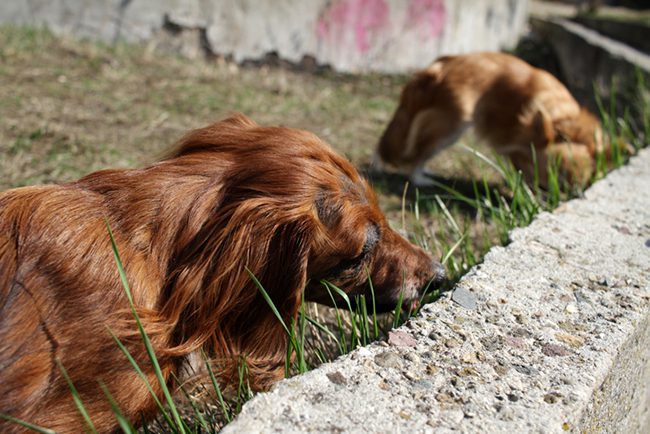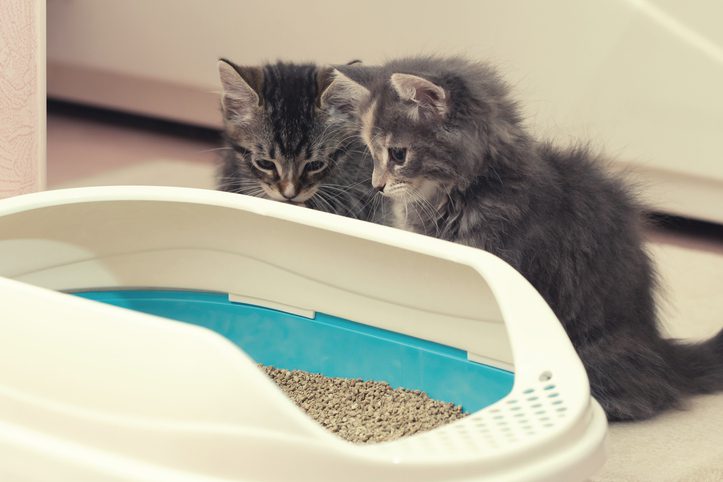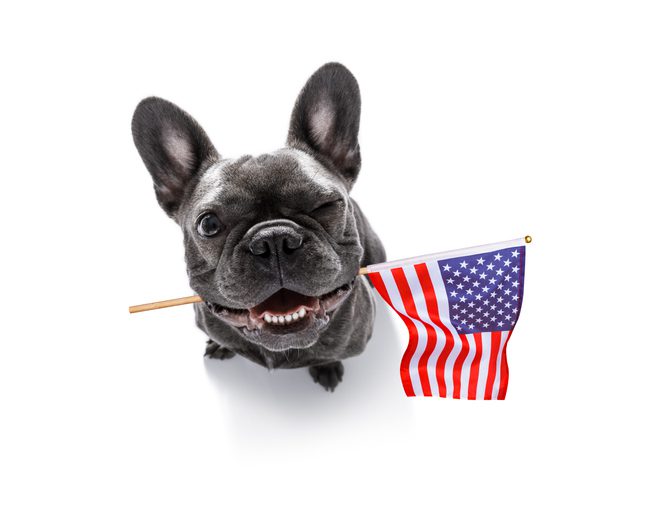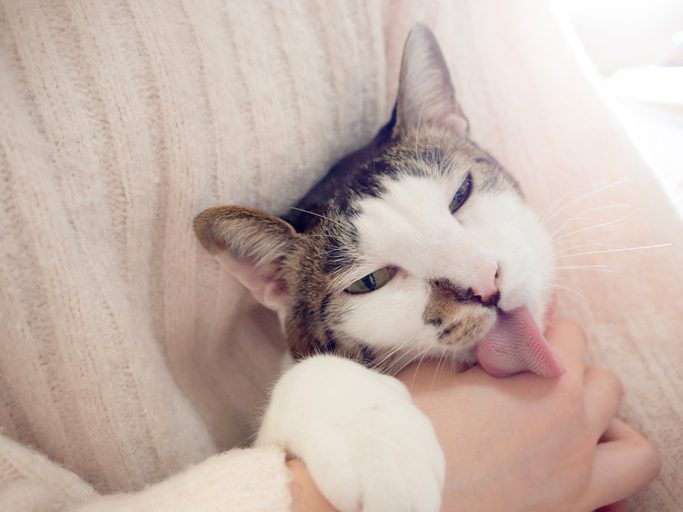Clifton Park Pet Owners: Why Do Dogs Eat Poop?
No, that’s not chocolate stuck between your dog’s teeth. You deal with this frustration on a regular basis. Let him out into the yard unsupervised for no more than 2 minutes, and already he’s picked something up. Or you took her on a walk, and despite your eagle- eye view of the area, she still followed her nose to another putrescent pile.

Coprophagia– when an animal eats feces, either that of another animal, or their own- is a behavior documented across many species, not just dogs. But our canine friends, who snuggle with us on the couch, and lick our faces lovingly, are probably the species this behavior is least desirable in.
In this article, we’ll go over why your dog eats poop and what to do about it.
Which Dogs are More Likely to Eat Feces?
Unfortunately this tendency crosses all boundaries with regard to age, size, and breed. Some owners see it in young puppies. On occasion, a dog might start doing it in middle- age.
Others wait until their golden years to give it a go. For some dogs, it’s just a “phase” that will stop on its own, as mysteriously as it started. For others, it’s a behavior owners will battle with life- long.
The Reasons Behind Dogs Eating Poop
Some dogs give us no indication whatsoever, about the reason they are drawn to eating poop. The typical school of thought amongst experienced veterinary professionals is that it is purely behavioral. However, concerned owners often wonder if there is some nutritional deficiency- wondering if they should change their dogs food or do some diagnostics.
The truth is, both of those are valid possibilities and neither theory can be rejected outright. In fact it is possible that both causes are working in tandem.
Behavioral Origins of Dogs Eating Poop
Dogs do not abide by the same social expectations that humans do. We think feces, malodorous things, and anything decayed, are gross and to be avoided. No socially aware human wants to walk around smelling like rotting garbage. Dogs, however, love nothing more than to eat or roll in a dead squirrel, moldy trash, and yes, sometimes poop. To dogs, it is a perfume. Au de toilet, as it were; heavy on the toilet. But a fine bouquet of poop and dirt is just one behavioral reason.
Dogs are also natural scavengers. If they are remotely hungry, or just plain interested, and come across something that smells like it’s good to eat, they will eat it. This behavior is most often observed in middle-aged or older dogs.
Why Do Dogs Start Doing It to Begin With?
When poop- eating behavior starts in a young puppy, owners understandably want to train it out of them as soon as possible. The best way to do this, is to understand the Why.
First, puppies learn quickly that poop eating is a great way to get attention. Like a toddler who mimics swearing- they do not understand the real impact of the behavior, what they know is that when they start swearing, people make lots of noise at them (be it laughter or scolding), and so the behavior continues and often gets worse. Puppies are the same way. When they grab a nugget, suddenly everyone is on their feet, and a session of play has begun! Then, of course, when someone gets too close, they swallow the offending object, because what toddler wants to share?
But funny behavior aside, there is something else important to recognize here. Some owners’ potty training methods might actually be teaching dogs to eat feces. Read that again.
Did you grow up in the era where punishing a dog for “going” in the house was the popular way to potty train? Think about that in this context. Dogs do not communicate the same way people do. Both humans and dogs can try to come to an understanding over time, but your dog can never understand the reasoning behind your expectations, and you can never understand every facet of their behavior.
Some people have “Always” potty trained their puppies with punishment. When they’ve found urine or feces on the floor, their first reaction is to yell, swat, or shove the puppy into it’s kennel. And some people still shove their puppy’s face into the pile of poop they left lying on the floor. This is where communication breaks down.
By doing this, the owner has NOT conveyed that going in the house is a problem. They have conveyed that the presence of feces is a problem. This is what the dog understands. So the dog does what it can to remedy that problem. Most often, their first reaction is to consume the offending pile the next time they leave one. Punishment- based potty training can literally train a dog to eat its own poop.
Metabolic Origins of Dogs Eating Feces
It is possible that poop-eating behavior has a health- related origin. Theories abound, but we’ll try to cover a few here.
Nutritional deficiencies are uncommon in the modern pet health world, because there are so many “complete and balanced” nutritionally sound commercial diets available. They are inexpensive compared to home- made diets, and provide more than the minimum nutrients required for the modern domestic dog to thrive. Most owners are concerned that they are feeding a poor quality diet, and that is why their dog is “deficient”. Truthfully, you would be hard pressed to find a diet that is truly deficient in essential nutrients, or so undigestible that the animal cant glean a reasonable amount of nutrition from it. There are few exceptions- they’re going to be the cheapest diets that are out there. But most pet owners don’t feed those diets.
The flip side to this argument involves a malabsorptive disorder. This means the diet may be fine, but the individual animal cannot digest and absorb the nutrients as well as other animals. This is an individual issue, not a diet quality issue. Because of this, if you have a dog who is a chronic poop- eater that can’t be managed behaviorally, you should ask your veterinarian about investigating. There are tests available that can evaluate your dog’s ability to digest and absorb nutrients. Solving the problem of malabsorption may be the key to eliminating the undesirable behavior.
Another health related reason for poop eating can be another disease process or even treatment option that causes an increased appetite. Some common diseases include diabetes, thyroid disease, or adrenal disease. The most common treatment that might cause an increased appetite is steroid use. All of these can cause a dog’s drive for food to increase. This leaves them prone to what is called indiscriminate ingestion.
It basically means the dog is eating anything and everything, without regard for whether or not it is actually food. This includes, but is not limited to feces. Owners might notice more garbage raiding behavior too, or that their dog wolfs down their meals faster than usual. Poop eating can accompany this. If you are concerned, it’s important to talk to your doctor.
How to Stop or Prevent Your Dog From Eating Poop
There are a variety of management options available, but before you try to manage poop- eating, you should talk to your veterinarian about figuring out the reason.
The most effective method to keep your dog from eating poop is simply to clean it up every time you see it. This often means walking your dog on a leash and picking up after them immediately. In multi- dog households, it means walking one dog at a time.
You can also use a basket muzzle- the cage-like muzzle that is built loose enough so dogs can continue to eat and drink while wearing it, but it provides a barrier to prevent them from eating larger objects. This might not always work, because feces are soft.
There are also ways to make feces taste “bad”, so dogs are less drawn to them.
Before deciding on any kind of management option for coprophagic-poop eating behavior, you should have a discussion with your veterinarian, and make sure your pet is in good health.
Recent Posts
My Cat Isn’t Using the Litterbox – Should I Be Concerned?
My Cat Isn’t Using the Litterbox – Should I Be Concerned? Understanding the preferences and needs of…
How to Help Your Dog Celebrate July 4th Peacefully
How to Help Your Dog Celebrate July 4th Peacefully The Fourth of July is a holiday of…
Cat Behavior: Why Your Cat Licks You
Cat Behavior: Why Your Cat Licks You If you have a cat, you’ve likely experienced the sensation…
About Us
Originally opened as Animal Care Hospital by Dr. Mark Johnston in 1989, the hospital became Cornerstone Veterinary Hospital in 2015 when it was purchased by Drs. Alan and Lisa Knott. The name 'Cornerstone' holds a special place in their hearts, representing not only their Christian faith but also their commitment to being the cornerstone of the community in which they practice. As a family-owned and operated practice, every pet is treated as part of the family, ensuring they receive the highest standard of care. The team at Cornerstone Veterinary Hospital is dedicated to building lasting relationships with clients and their beloved pets, striving to be the cornerstone of the community in which they practice.



